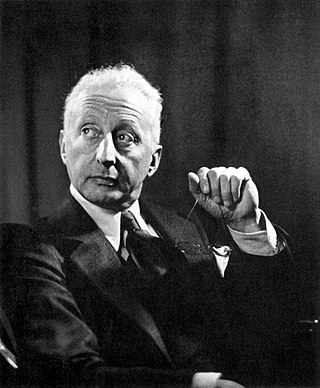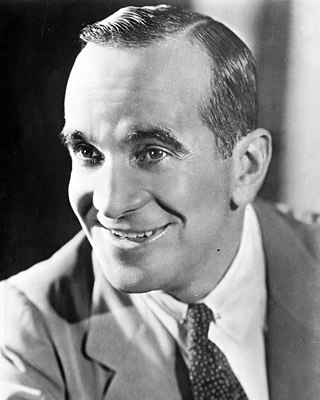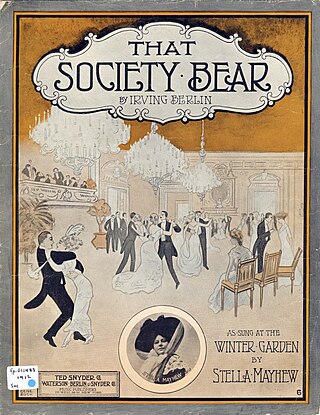
Jerome David Kern was an American composer of musical theatre and popular music. One of the most important American theatre composers of the early 20th century, he wrote more than 700 songs, used in over 100 stage works, including such classics as "Ol' Man River", "Can't Help Lovin' Dat Man", "A Fine Romance", "Smoke Gets in Your Eyes", "The Song Is You", "All the Things You Are", "The Way You Look Tonight" and "Long Ago ". He collaborated with many of the leading librettists and lyricists of his era, including George Grossmith Jr., Guy Bolton, P. G. Wodehouse, Otto Harbach, Oscar Hammerstein II, Dorothy Fields, Johnny Mercer, Ira Gershwin and Yip Harburg.
This is a list of notable events in music that took place in the year 1918.

Emmerich Kálmán was a Hungarian composer of operettas and a prominent figure in the development of Viennese operetta in the 20th century. Among his most popular works are Die Csárdásfürstin (1915) and Gräfin Mariza (1924). Influences on his compositional style include Hungarian folk music, the Viennese style of precursors such as Johann Strauss II and Franz Lehár, and, in his later works, American jazz. As a result of the Anschluss, Kálmán and his family fled to Paris and then to the United States. He eventually returned to Europe in 1949 and died in Paris in 1953.

The Winter Garden Theatre is a Broadway theatre at 1634 Broadway in the Midtown Manhattan neighborhood of New York City. It opened in 1911 under designs by architect William Albert Swasey. The Winter Garden's current design dates to 1922, when it was completely remodeled by Herbert J. Krapp. Due to the size of its auditorium, stage, and backstage facilities, it is favored for large musical productions. It has 1,600 seats and is operated by The Shubert Organization. The auditorium interior is a New York City landmark.

"Carolina in the Morning" is a popular song with words by Gus Kahn and music by Walter Donaldson, first published in 1922 by Jerome H. Remick & Co.

The Shubert Theatre is a Broadway theater at 225 West 44th Street in the Theater District of Midtown Manhattan in New York City. Opened in 1913, the theater was designed by Henry Beaumont Herts in the Italian Renaissance style and was built for the Shubert brothers. Lee and J. J. Shubert had named the theater in memory of their brother Sam S. Shubert, who died in an accident several years before the theater's opening. It has 1,502 seats across three levels and is operated by The Shubert Organization. The facade and interior are New York City landmarks.

The Princess Theatre was a joint venture between the Shubert Brothers, producer Ray Comstock, theatrical agent Elisabeth Marbury and actor-director Holbrook Blinn. Built on a narrow slice of land located at 104–106 West 39th Street, just off Sixth Avenue in New York City, and seating just 299 people, it was one of the smallest Broadway theatres when it opened in early 1913. The architect was William A. Swasey, who designed the Winter Garden Theatre two years earlier.

At Home Abroad is a revue with music by Arthur Schwartz and lyrics by Howard Dietz. It introduced the songs "Love Is a Dancing Thing", "What a Wonderful World" and "Got a Bran' New Suit", among others. The revue follows a bored couple who flee America and go on a musical world tour.

Robinson Crusoe, Jr. is a musical with a book by Edgar Smith, lyrics by Harold R. Atteridge, and music by Sigmund Romberg and James Hanley.

Sinbad is a Broadway musical with a book and lyrics by Harold R. Atteridge and music by Sigmund Romberg, Al Jolson and others. Jolson plays a porter in old Bagdad where he meets a series of characters from the Arabian Nights, including Sinbad. He is transported to various exotic settings.

Al Jolson was a Lithuanian-American Jewish singer, comedian, actor, and vaudevillian. He was one of the United States' most famous and highest-paid stars of the 1920s, and was self-billed as "The World's Greatest Entertainer." Jolson was known for his "shamelessly sentimental, melodramatic approach" towards performing, as well as for popularizing many of the songs he sang. Jolson has been referred to by modern critics as "the king of blackface performers."

Michael Elder Rourke, who assumed the pen name Herbert Reynolds in 1913, was an Irish-American lyricist. Reynolds wrote the lyrics to Jerome Kern's first big hit, "They Didn't Believe Me", interpolated into the 1914 American version of The Girl from Utah, produced by Charles Frohman. The show had a successful run of 140 performances at the Knickerbocker Theatre, opening on August 14, 1914. Frohman had hired the young Kern to write five new songs for the score together with Reynolds to strengthen what he felt was a weak first act. Julia Sanderson and Donald Brian starred in the production.

The Passing Show was a musical revue in three acts, billed as a "topical extravaganza", with a book and lyrics by Sydney Rosenfeld and music by Ludwig Engländer and various other composers. It featured spoofs of theatrical productions of the past season. The show was presented in 1894 by George Lederer at the Casino Theatre. It was one of the first musical revues on Broadway and led the fashion for such productions. The Casino Theatre produced a revue each summer thereafter for several seasons.
Miss 1917 is a musical revue with a book by Guy Bolton and P. G. Wodehouse, music by Victor Herbert, Jerome Kern and others, and lyrics by Harry B. Smith, Otto Harbach, Henry Blossom and others. Made up of a string of vignettes, the show features songs from such musicals as The Wizard of Oz, Three Twins, Babes in Toyland, Ziegfeld Follies and The Belle of New York.
Vera Violetta was an operetta including a libretto by Louis Stein and music by Edmund Eysler, additional music by George M. Cohan, Jean Schwartz and Louis A. Hirsch. Set in Paris, the work is about the flirtatious wife of a professor. Vera Violetta was the name both of her Roger & Gallet perfume and a waltz which celebrated it.

Willie Howard and Eugene Howard, billed as the Howard Brothers, were Silesian-born American vaudeville performers of the first half of the 20th century. They were two of the earliest openly Jewish performers on the American stage.

Make It Snappy was a musical revue that ran for 96 performances at the Winter Garden Theatre in the 1922–23 Broadway season. It ran from 13 April to 1 July 1922. It starred Eddie Cantor, who introduced the hit songs "Yes! We Have No Bananas" and "The Sheik of Araby".
Jesse C. Huffman (1869–1935) was an American theatrical director. Between 1906 and 1932 he directed or staged over 200 shows, mostly for the Shubert Brothers. Many of them were musical revues, musicals or operettas. He is known for The Passing Show series of revues that he staged from 1914 to 1924 at the Winter Garden Theatre on Broadway, daring alternatives to the Ziegfeld Follies.

The Whirl of Society was a satirical Broadway musical that played at the Winter Garden Theatre from March 5 to June 29, 1912. Louis A. Hirsch composed the music with lyrics by Harold Atteridge, to a book by Harrison Rhodes. The production also featured songs by Arthur Fields. The Whirl of Society was part of a production also featuring Sesostra and A Night with the Pierrots, for 136 productions. The musical is set in New York City and takes place in the drawing room and ball room of Mrs. Dean.

Stella Mayhew was an American actress and vaudeville performer.

















